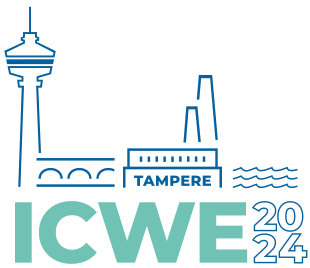ICWE 2024 – AT A GLANCE
The International Conference on Web Engineering (ICWE) is the premier annual conference on Web Engineering and associated technologies. It covers different aspects of Web Engineering, including the design, creation, maintenance, operation, and usage of Web applications.
ICWE aims to bring together researchers and practitioners from various disciplines in academia and industry to tackle the emerging challenges in the engineering of Web applications, the problems and opportunities of its associated technologies, and the impact of those technologies on society and culture.
Following the general debate on the need for human-centric and responsible technology, the 24th edition of ICWE in particular invites contributions under the following general theme:
Ethical and Human-Centric Web Engineering: Balancing Innovation and Responsibility in Web Technology
We indeed solicit contributions on diverse aspects related to designing innovative Web technology that however results in being fair, ethical, transparent, privacy-preserving, trustworthy, and inclusive for all.
These aspects relate to a wide spectrum of Web Engineering topics, such as, among others:
- Web application modeling and engineering
- Web infrastructures and architectures
- Web of Things, Social Web and Mobile Web applications
- Web mining, knowledge extraction and analytics of Big Data on the Web
- Machine Learning, AI and Language Models for Web Engineering
- Web user interfaces and UX
- User-centered, fair and explainable Web technology
- Inclusivity and accessibility for the Web
- User Modeling and Web-based Recommender Systems
- Quality aspects of Web applications
- Performance, scalability, energy-efficiency and sustainability aspects of Web applications
- Semantic Web, Knowledge Graphs, Web ontologies, and Linked Open-Data applications
- Web crowdsourcing and human computation
- Web composition and mashups
- Web services, Microservice architecture, computing, workflows, and standards
- Architecting the Web in the cloud continuum, e.g. cloud, fog, edge and serverless computing for Web applications
- Web security, identity, trust and privacy engineering
- Web Engineering processes, practices, experience and paradigms, e.g. Agile, Lean
- Human-centered methods for Web Engineering
- Re-decentralization of the Web
- Web standards and disruptive Web technologies
- Comparisons, data sets, empirical studies of Web technologies
- Web programming languages, tools and frameworks
In addition to the research track, ICWE 2024 also seeks contributions of demos posters, and student papers at the Ph.D. Symposium, tutorials, and workshops will be the subject of individual calls.
SUBMISSIONS TO THE RESEARCH TRACK
This call addresses research contributions in one of the following two categories:
- Full papers (15 pages, Springer LNCS format): mature, original research contributions. Reported results must be supported by some type of evaluation, and also include a justification about the choice/suitability of the evaluation method. In addition, evidence of use in practice and/or demonstration of scalability is regarded as a plus.
- Short papers (8 pages, Springer LNCS format): short papers presenting a discussion – analysis, criticism, proposal, vision, etc. about relevant aspects of Web engineering topics. These papers are intended to generate discussions that promise potential for research that will impact Web Engineering in the coming years.
Papers must be formatted according to the Springer LNCS authors’ instructions available at https://www.springer.com/gp/computer-science/lncs/conference-proceedings-guidelines and must be submitted in PDF format through the ICWE 2024 EasyChair web page https://easychair.org/conferences/?conf=icwe2024.
Papers submitted to ICWE 2024 must not be under review elsewhere while under consideration for ICWE 2024, nor may have been previously published elsewhere. Manuscripts that are not in compliance with the required submission format, stated page limits, or that are out of the scope of the conference will be desk rejected without review.
We strongly encourage authors to facilitate replication of their research in order to increase visibility, reproducibility, and impact by making relevant artifacts (data, source code, etc.) available for reviewers and readers.
Upon acceptance, one corresponding author of each paper, acting on behalf of all of the authors of that paper, must complete and sign a Consent-to-Publish form, through which the copyright for their paper is transferred to Springer. Then, at least one author of each accepted submission must register for the conference and present the work during the corresponding session in person.
Accepted contributions will be included in the ICWE 2024 Springer LNCS proceedings. The best papers will be selected to be proposed, in extended form, as part of a special issue of the Journal of Web Engineering (https://journals.riverpublishers.com/index.php/JWE/).
USE OF GENERATIVE AI
Authors should explicitly disclose the use of generative AI and AI-assisted technologies in their manuscripts when these tools are employed for more than just editing the author’s text. This disclosure can be made through a statement placed at the end of the manuscript, preceding the References section.
If it comes to our notice that a submission utilizes large language models (LLMs) without clear disclosure, such papers will be subject to immediate desk rejection. However, if there is no usage of such technologies, no disclosure statement is required.
SPRINGER BEST-PAPER AWARD SPONSORSHIP
Springer will sponsor the ICWE 2024 Best Paper Award which will be announced during the ICWE 2024 Banquet.
IMPORTANT DATES
All dates are according to the time zone “Anywhere on Earth”, i.e., UTC-12.
- Abstract submission:
January 26, 2024February 2, 2024 - Paper submission:
February 2, 2024February 9, 2024 - Author notification: March 22, 2024
- Camera-ready due: April 8, 2024
PROGRAM CHAIRS
- Sebastian Heil, Technische Universität Chemnitz, Germany
- Maristella Matera, Politecnico di Milano, Italy
GENERAL CHAIRS
- Kostas Stefanidis, Tampere University, Finland
- Kari Systä, Tampere University, Finland
CONTACT
Any questions you may have regarding submitting contributions to the research track should be emailed to pcchair.icwe2024@webengineering.org
